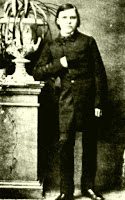Saturday, 23 August 2008
Nietzsche and the Daemon of Socrates
Just a brief post, as I found something interesting while reading Peter Durno Murray's Nietzsche's Affirmative Morality. I had just recently posted on the forum about the philosophical underpinnings of the concept of the daimon ( the spelling in antiquity) and its depiction as a higher or second self which serves as witness and guardian to the earthly man in life in the Deo Socratis by Apelieus of the second century.
Now, while reading Murray's text on Nietzsche, I have come across a section on Socrates and his daimon. Nietzsche asserts that Socrates ( and hence, Plato and the entire neo-Platonist tradition, including Arthur Schopenhauer) erred grievously in limiting discourse always to reason and the rational, thereby dismissing - and dishonoring - the darker Dionysian elements of life, art, and culture. He points out that the daimon of Socrates seemed wholly aware of this error, and limited Socrates in order that he not "blaspheme these deities" of the irrational and creative realms within the human.
I found this an extremely interesting assertion in the light of Peakian daemonology: During the historical transition from the ancient Greek world to the rational world of Platonism (which would become the Christian and democratic Europe of his day; and of which Socrates was the prophet and the spearheading master) - the daemon itself was making provisions, and holding in reserve almost, the Dionysian realm, and not allowing Socrates a wide berth with regard to its mysteries and secret animus. As a philosopher, to see a Peakian idea leap out of a page written by a very astute philosopher, on one of the greatest philosophers of the modern world, is very invigorating, very inspiring. ( By the way, that photo is a favorite of mine: Wasn't Nietzsche the sweetest thing as a teenager?) SMK
Now, while reading Murray's text on Nietzsche, I have come across a section on Socrates and his daimon. Nietzsche asserts that Socrates ( and hence, Plato and the entire neo-Platonist tradition, including Arthur Schopenhauer) erred grievously in limiting discourse always to reason and the rational, thereby dismissing - and dishonoring - the darker Dionysian elements of life, art, and culture. He points out that the daimon of Socrates seemed wholly aware of this error, and limited Socrates in order that he not "blaspheme these deities" of the irrational and creative realms within the human.
I found this an extremely interesting assertion in the light of Peakian daemonology: During the historical transition from the ancient Greek world to the rational world of Platonism (which would become the Christian and democratic Europe of his day; and of which Socrates was the prophet and the spearheading master) - the daemon itself was making provisions, and holding in reserve almost, the Dionysian realm, and not allowing Socrates a wide berth with regard to its mysteries and secret animus. As a philosopher, to see a Peakian idea leap out of a page written by a very astute philosopher, on one of the greatest philosophers of the modern world, is very invigorating, very inspiring. ( By the way, that photo is a favorite of mine: Wasn't Nietzsche the sweetest thing as a teenager?) SMK
Subscribe to:
Post Comments (Atom)



4 comments:
Addendum: Nietzsche contrasts the Dionysian with the Apollonian aspects of art and culture, and believes in the fusion of these, which Christianity rejected. There are many ways in which his Dionysus has a daemonic role to play in his own individual life, and in his homage to "the unknown god".
Susan Marie: Now, it probably won't surprise you to know (and brace yourself) that I have a photograph of me when I was about 10 years old looking rather uncannily like dear old Freddie in that photograph!
Well, my Mother has it, and I also believe she still has the coat that again looks strangely similar!
Anyway, the Socatic origins of the term Daimon have, of course, been long discussed on here and I agree that it is no pure synchrondipity that led dear AP to choose the ancient ones terminology.
I must admit that I do prefer the Daemon spelling (sorry Jake) BUT there is also the etymological bastardisation towards the Dark Side that is regrettable
BLOG: Peakeian Daemonology
[by Karl L Le Marcs]
No, I am not surprised. ( I had actually had this thought independently, that you must have had this look and air, and your mother must have loved and encouraged it in the boy---but you will never believe me: no matter.) Nor will you be by my demand that your mother share the photo with this community of bloggers. Tell her it has philosophical implications which may help to solve a mystery wrapped in an enigma and concealed by a riddle. Does Jake, then , prefer "daimon" for its link to Heraclitus??????????????
Susan Marie: For a brief discussion please see:
Matrix Warrier (sic) - Being The One
[ by Tony ]
I would expect the Heraclitus link to be the primary reason yes.
Post a Comment